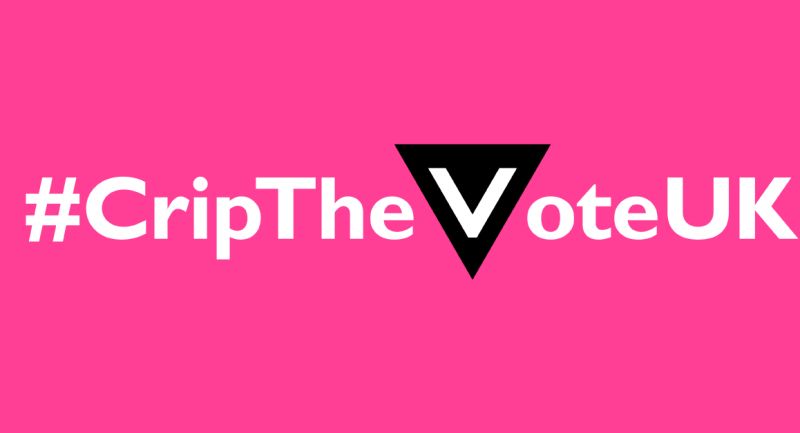A new, non-partisan online campaign could have helped bring about an “awakening” among some disabled people that their hard-fought rights are at stake in tomorrow’s general election, according to its founders.
#CripTheVoteUK was only launched in late April, but the disabled activists who founded the campaign believe it has made a small but significant contribution towards their aim of enabling disabled people to become a genuine political force.
The #CripTheVoteUK hashtag has been widely shared during the general election campaign, and weekly Twitter discussions have also raised its profile.
On Sunday, in the last of the discussions before tomorrow’s general election, actor and activist Liz Carr led a debate on the representation of disabled people and hate crime.
One of the campaign’s founders, Eleanor Lisney, told Disability News Service that she believed disabled people would have an impact on tomorrow’s election.
And she said she believed there had been more of a focus on disability than in previous election campaigns.
She said: “When you read the news, even people who are not disabled still mention us, they still mention how the cuts have affected us. We get mentioned. More than previous elections, even 2015.”
She said this had been particularly noticeable in the television debates.
Another of the campaign’s founders, Rick Burgess, said it was difficult to judge the impact of the #CripTheVoteUK campaign on the election but from the media coverage he had seen “we’ve done well, given the snap election time frame”.
The “proof of the pudding” was whether this helped to drive voter turnout among disabled people, he said.
He added: “The main thing is I hope it lays the groundwork for a proper permanent lobbying effort, because governments of any hue always need pressure to keep them to their promises once in power.”
Burgess said that continuing efforts to organise disabled people “into an informed and active political lobby will be essential to protecting our rights and lives.
“What the last seven years have proved is we cannot rely on charities, the medical community or society at large to respect our rights; we have to fight for ourselves.
“It’s a lesson from the past we have to relearn.”
And he said the stakes were high in tomorrow’s election.
He said: “This election can see the end of the abusive work capability assessment and personal independence payment regime, or we can see another five years of increasing death toll, cuts, and hate crime.”
Although #CripTheVoteUK has only had a few weeks to make an impact, Lisney said she hoped its influence would grow.
She said: “I am hoping that #CripTheVoteUK is waking people up to the fact that there is a power, a voice, that you can have.
“If you don’t fight, you can lose the rights that you are taking for granted.
“I hope they are awakening to the fact that you can lose what you are complaining about, the rights we have fought for.”
One of the challenges, she said, had been to maintain the principle that the campaign was non-partisan, and did not support one party over another.
She said: “What I tend to say is, ‘Look at the figures, decide for yourself, vote for yourself and your family and your community.’
“I think what we need to do is tell people what is happening. I make sure that what I send out [on Twitter] is from a reputable source.”
Lisney said she had been pleased that her local Labour candidate mentioned the campaign when he knocked on her door to discuss the election, after she had referred to it in social media messages she sent him.
But Lisney said she had been “a little surprised and frustrated” by the attitude of some of the disability charities, who have refused to support the campaign, and had told her that “our trustees won’t like it” if they support #CripTheVoteUK on social media.

 Disabled voter secures legal settlement over polling station discrimination
Disabled voter secures legal settlement over polling station discrimination Benefit claimants take to social media to describe DWP ‘hell’ and ‘abuse’
Benefit claimants take to social media to describe DWP ‘hell’ and ‘abuse’